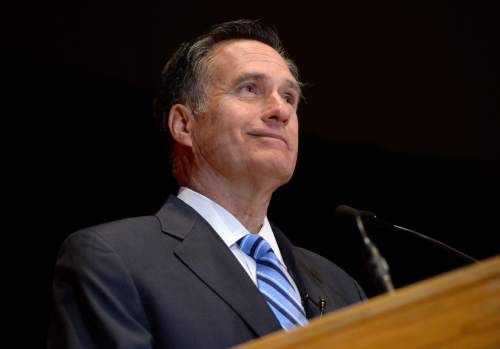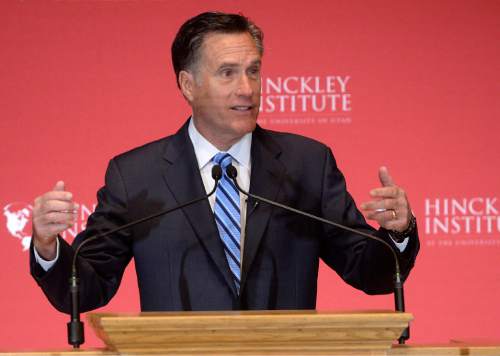This is an archived article that was published on sltrib.com in 2016, and information in the article may be outdated. It is provided only for personal research purposes and may not be reprinted.
Washington • Despite concerns that evangelical voters may not rally around Donald Trump, a new poll shows that they are lining up behind the presumptive Republican presidential nominee more strongly than they did four years ago for Mitt Romney.
The survey by the Pew Research Center shows that about 78 percent of white evangelicals would vote for Trump, a Presbyterian, compared to the three-quarters who said so about Romney, a Mormon, at this point in the 2012 election. A third of those polled are "strongly" supporting Trump, as opposed to 25 percent who said so about Romney.
The poll suggests that while Trump may not be as devout in his faith as Romney, evangelical voters support him more fully than they did a Mormon candidate whose LDS religion was a factor in his quest for the Oval Office.
Trump has been courting evangelical leaders and hopes to find solid support from that base, something Romney attempted as well. Percentage-wise, the former Massachusetts governor received more votes that year from the evangelical voting bloc than did Arizona Sen. John McCain in 2008, though fewer evangelical voters turned out in Romney's race.
"The idea of voting for a Mormon was, in their mind, literally the equivalent of voting for a cult leader or someone who worships Satan. I think that was horrible; it shouldn't be, but there was that kind of sentiment," said the Rev. Greg Johnson, president of Standing Together, a network of 100 evangelical churches along the Wasatch Front. "With Trump, they don't look at him as a cult leader, and so they give him kind of a pass even though he's kind of a man who has supported abortion."
Johnson, who met with the presumptive GOP nomine and other evangelical leaders in New York in June, is not a "Trump fan" and said he is praying for guidance in this election.
If he had to choose right now, he said, he would vote for Trump because he's promised to appoint anti-abortion judges and fight federally sanctioned gay marriage.
Trump calls himself a Presbyterian, though he was seen as the least religious of the Republican presidential contenders this cycle. Nealy half (44 percent) of white evangelicals said in January they didn't believe Trump was particularly religious.
Romney is a devout Mormon and a former regional lay leader who pushed back on advice that he would be more successful in his bid if he distanced himself from his faith.
The Pew study did not survey enough Mormon voters to make any calculation as to their support or opposition to Trump, though it's clear that most members of The Church of Jesus Christ of Latter-day Saints are not his allies. Trump finished a distant third in Utah's Republican primary, claiming 14 percent of the votes.
Romney, who now lives in Utah, has said he will not back Trump, dismissing him as a "phony, a fraud."
"His promises are as worthless as a degree from Trump University," Romney said in March. "He's playing members of the American public for suckers: He gets a free ride to the White House, and all we get is a lousy hat."
Trump later questioned whether Romney was really a Mormon.
The LDS Church does not endorse candidates or parties, though it did issue a statement supporting religious freedom after Trump raised the idea of banning all Muslims from entering the United States.
Jessica Martinez, a senior researcher at the Pew Research Center, said the support Trump is finding among evangelicals is interesting, especially given that leaders of the religious right have not signaled full-throated backing.
"It's not a huge difference for what we saw with Romney, but it is a difference in the strength of support," Martinez said. "Some people might find that surprising, given there are some evangelical leaders who are speaking out with reservations."
Russell Moore, president of the Ethics and Religious Liberty Commission of the Southern Baptist Convention, the nation's largest Protestant denomination, has said that supporting Trump would put evangelicals on the "other side of the culture war."
"To back Mr. Trump, these voters must repudiate everything they believe," Moore wrote in a New York Times op-ed.
Trump has found some support from the evangelical community.
Pastor Robert Jeffress of the First Baptist Church in Dallas, said previously that Trump opponents are "namby-pamby" and that Christians must "get off the fence" and vote.
Trump, Jeffress said on the radio program "Right Wing Watch," is "not exactly like us," but "at least he likes us."
In 2012, Jeffress said that Romney's religion was a "cult" and later wrote in his book that Mormon founder Joseph Smith was a "servant of Satan."
While evangelicals' support is strong for Trump, the Pew survey also found that they chose the Republican candidate more as a vote against Democratic nominee Hillary Clinton. About 45 percent said they picked Trump over Clinton versus 30 percent who said their vote was mainly for Trump.
Other survey findings
• Black Protestants solidly favor Hillary Clinton over Donald Trump, 89 percent to 8 percent.
• Catholics divide sharply along racial lines. Hispanic Catholics prefer Clinton to Trump 77 percent to 16 percent. But half of white Catholics favor Trump, and 46 favor Clinton.
• Half of white mainline Protestants say they will vote for Trump, while 39 percent favor Clinton.
Religion News Service





